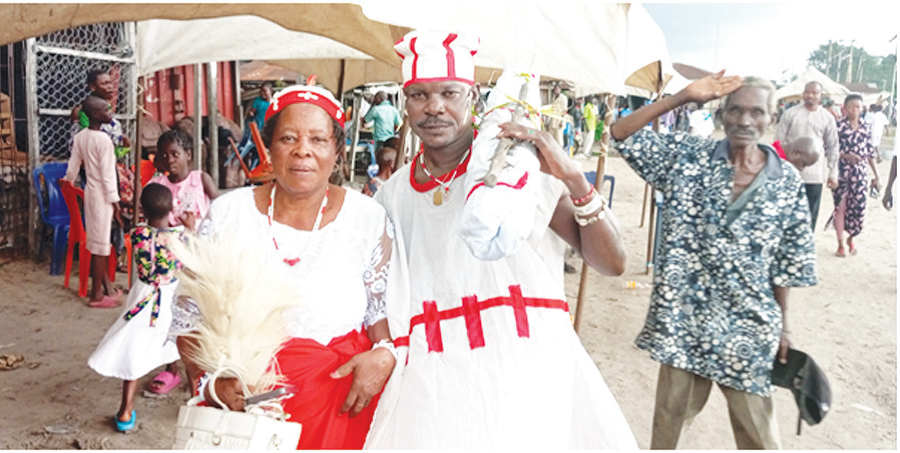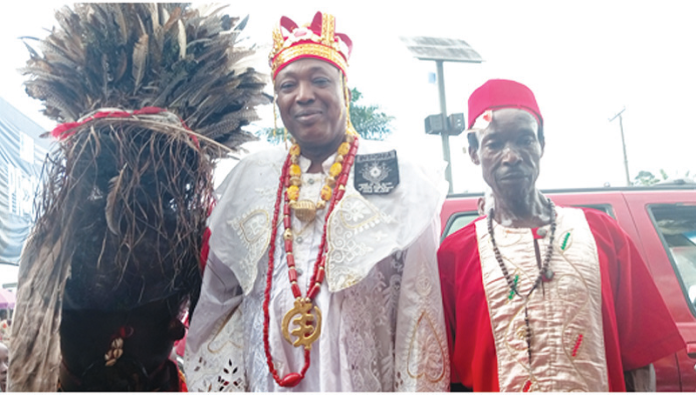BY LUCY EZELIORA
IKENGE festival is an annual thanksgiving of the Ogume people of Ndokwa West Local Government Area of Delta State which also aims to seek the ancestral spirits’ benevolence in the next planting season.
A visit to the palace of the Regent, revealed the town’s traditional ambience rooted in a deep cultural heritage.
This year’s festival in Ogbe Ogume, the seat of ogume land was indeed a remarkable celebration.

It is a period when families pray and commit themselves to the protection and guidance of their ancestors.
The festival kicked off with a prayer by the Regent, cleansing the community in the morning with his Chief Priest offering sacrifices to the gods of the land.
The Reagent, known as His Royal Most Supreme Eminence, Dr. Valentine Sunday Akpati, is the Chairman of International Human Rights Commissions rft Committee of African indigenous religions Africa, the Paramount ruler of Royal Traditional Priesthood Federation and the OkpalaUku of Ogbeogume traditional Council of Ogume town, in Ndokwa West Local Government Area of Delta State.
The road network that leads to the community showcased a tremendous transformation in every part of Ogume town, The roads were beautifully tarred with trees of various food crops swaying left and right while yam farms could be seen cultivated in every environs of the community which showcased the town as a community blessed with farmers.
Also the town is blessed with standard infrastructure, consumables agricultural produce, markets and other beautiful locations.
Speaking with the Ragent who is the Osele -Uku of Ogume and the Oghene of Ogbeogume traditional Council, he disclosed that, the Ikenge celebration is a season of merriment for every indigens of Ogume land.
He said, in Ogume town, it is believed that every man has an Ikenge who guides, protects, serves and even provides his needs. As a warrior festival, It is a common belief that the level of good health and prosperity a man attains in life are dependent on his Ikenge.
According to the Osele-Uku of Ogume town, Ikenge means ‘strength’ or ‘destiny’, or the ‘god of strength’, or ‘the god of destiny’ depending on the context of usage. During the festival, it is required of every man to worships his Ikenge to avoid hard luck and misfortune. Ikenge offers families and friends the opportunity to re-unite and worship their common ancestry and individual god (Chi). During the festival,
Ukele music serves as a medium through which the people (Ndi Ogume) commune with the gods of the land. Also, the musicians through
their music invoke the spirit beings, the ancestors and invite the people to share from the blessings they bring. The Ragent also shower prayers and lead the people to worship and supplication, for it is believed that any request asked for during the festival will be granted.
As the festival proceeds, warriors of different quarters, dressed in war robe decorated with multiple colours of feathers tied all over their heads, dancing with their followers to celebrate and renew their loyalty to the service of the community.
According to the Ogume tradition, the warrior celebrations emerged during the early days when the people had to fight and wage wars to survive as a people. The songs act started off as a victory display used to celebrate and welcome back the warriors from the battle field. The warrior act became used to motivate and spur warriors during the preparation
for battle; and, to invoke the protection of the gods and the ancestors upon them. From the pre-historic times, the Ikenga songs are was used to bury dead warriors. This is an aged long tradition that reflects on the life, commitment and contributions of the deceased warriors to the community. The music also speaks to the consciences of the living heroes.
They strengthen the course that binds them together as a people thereby forming stronger alliance(s) against outside forces that may challenge their peaceful co-existence.
Ikenge warrior festival is considered remarkable because during the period, there is usually increase in demand and supply which means more profit for those who do buying and selling due.
The festival usually celebrated in the month of June or July, allows family members and visitors living outside Ogume to participate in the festival. Ikenge begins every year with each community coming together to worship the Supreme Being and common ancestors.
Families supplicate family ancestors and individual Ikenge for good health, bountiful harvests and for protection against all forms of ailments, temptations and evil. Throughout the festival, yam portage with smoked fish is the main delicacy for the celebration.
For this year’s celebration, the festival was indeed great. From the mid- afternoon of the final day, the people of Ogume dance to different beats of the drum and side attractions. The warriors and followers parades with the Ogume masquerade known as Mmanwu and Ochu masquerades from the seven quarters of Ogume kingdom, gathering at Ogbe-Ogume (one of the quarters in Ogume) to entertain the entire community.
While Mmanwu and Ochu continue with their side attractions, the warriors in turns dance to Ukele music before Okuma, (a six feet tall drum with four legs that appears only during Ikenge festival).
The dance, (EguUkele) is employed as the main source of musical entertainment during Ikenge festival to enliven people’s moods. The sound of the music reminds the people of the ideals of Ikenge and invites them to participate excessively in it. Warriors who had ‘done heroic acts often give special performance which end with the casting of the leg on Okuma. This act symbolises brevity and strength.
While the entertainment continues with a carnival during evening hours with food and drinks in surplus just as Musicians, warriors, masquerades and the community people gather to witness the closing ceremony, to end the great Ikenga festival.
While the Ragent and Chief Priest takes a spiritual walk to a secluded serene to perform the closing ceremony ritual to the merriment of the people of Ogume town.


